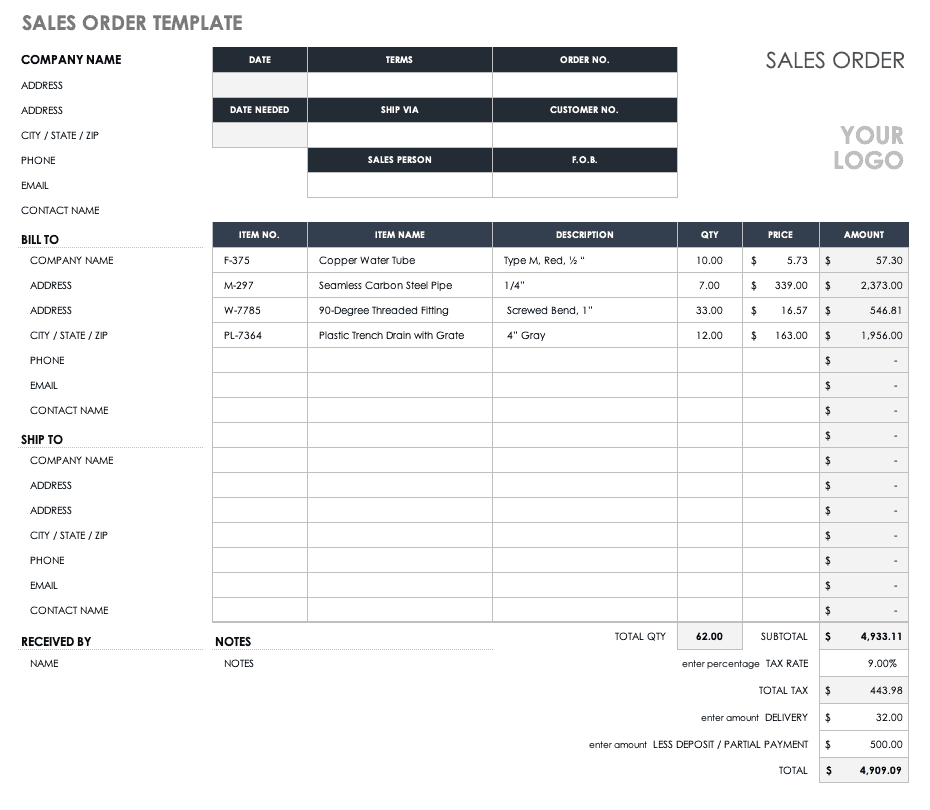Post map
ToggleIf drafting an order isn’t a familiar habit for you, or you find it challenging to find the right way to do it, don’t worry. In today’s article, Optimal Fb will help you explore various what information does a sales order contain? types of orders, the importance of orders, and the information contained in them.
Learn more about orders
An order is a detailed document about a purchase order and the terms of the transaction. Typically, it’s created by the seller after they receive an order from a customer. In cases that aren’t direct sales transactions, the order is generated after the customer agrees to purchase a product. The information in an order usually includes details about the customer, product specifics, pricing, and shipping details. Since it’s not a binding contract, either party can adjust the order details after the sales transaction is completed. When carefully drafted, an order allows companies to confirm the accuracy of the transaction before shipping. After completing the sales transaction, they provide a transaction record to the buyer.
What information does a sales order contain?
Generally, an order should include the following:
- Information about the selling company, including name and address.
- Contact information of the buyer, including name, address, phone number, and email address.
- Order date and estimated shipping and/or delivery date.
- Detailed information about the product, including name, quantity, and description.
- Product price (pre-tax) and any other fees.
- Taxes and other applicable fees.
- Terms and conditions of the transaction, are usually drafted by the selling company’s legal team.
- Signatures of both the buyer and the seller, to confirm agreement and commitment.
- Any other necessary or relevant information for the specific transaction.

Categorize some popular orders
There are four different types of sales orders, each suitable for specific situations as follows:
- Cash: This is the simplest and least detailed type of order. There’s no related receivable, just cash payment. After placing an order, customers pay and the order is shipped. Sometimes, customers might receive and pay for the order right at that moment. Example: a customer orders a mattress online, goes to the store to pay, and receives the mattress.
- Rush: When customers need their orders faster than the usual processing time, you can use this type of order. The major difference from cash orders is that customers pay after the order is fulfilled. Rush orders are usually completed on the same day they are placed.
- Scheduled Agreement: Similar to regular orders, scheduled agreements provide detailed information about order fulfillment, including delivery times and specific quantities for each item sold. This is often the choice for more complex orders requiring careful planning.
- Third-Party: Small businesses often use this type when they need to use a third party to handle and ship products. After creating this order, the supplier continues to process and fulfill it. This helps streamline the process and reduces the burden on the business in fulfilling orders.
The importance of orders in business
Order documents aren’t just part of the sales and fulfillment process; they also offer numerous other essential benefits:
- Increased efficiency: Centralizing sales information streamlines order processing, making it much faster. This convenience saves time and enhances the accuracy and efficiency of your operations. You can effortlessly monitor order statuses, ensuring timely and accurate deliveries. Moreover, integrating purchase orders into your financial workflow aids in effective cash and payment management, reducing financial risks and fostering sustainable growth opportunities.
- More accurate orders: Utilizing purchase orders helps eradicate or reduce errors in order processing. Precise order details are crucial for preventing mistakes, thereby boosting customer satisfaction and fostering a professional and efficient workplace. Automating the process further ensures accurate and timely information handling.
- Better inventory visibility: Order documents enable detailed and timely inventory tracking. This facilitates easier and more accurate preparation for forthcoming orders, preventing stock shortages or delivery delays.
- Improved customer experience: A seamless and accurate order fulfillment process, backed by comprehensive order documentation, elevates the customer experience. Precision and professionalism in order handling leave a positive impression on customers, and increase the likelihood of their return and continued use of your products or services.

In our Optimal FB article, we’ve provided detailed and accurate information. We hope our content aids you in understanding common order types and their implementation. Now, complete the order details as thoroughly and comprehensively as possible.
Contact Info
Are you in need of Facebook advertising or need to rent a quality Facebook advertising account? Don’t worry! Optimal FB is a unit specializing in providing reputable Facebook accounts, as well as direct advertising support. Provides all types of advertising accounts such as facebook casino ads to help you reach and create fast conversions.
Frequently Asked Questions
When creating an order, there are some important things to consider to ensure the sales process runs smoothly and efficiently. First, make sure that the order contains complete information about the product, including name, description, and specific quantity. Next, the contact information of both the buyer and the seller needs to be clearly stated for easy communication and confirmation of the transaction. Additionally, clearly stating the terms and conditions of the transaction will help avoid misunderstandings and disputes later. Finally, thoroughly checking and ensuring the accuracy of information before submitting an order is essential to avoid unnecessary errors and confusion.
Although purchase orders are an important tool in managing sales transactions, there are limitations to keep in mind. One of the main limitations is that the manual process can be time-consuming and labor-intensive, especially when a large number of orders need to be processed. Additionally, sending and processing orders by transmitting paper documents can cause delays in the process, especially in business environments that require flexibility and speed. Furthermore, maintaining and managing paper-based order records can cause complexity and difficulty in finding information when needed. For businesses that operate on a large scale and need to process a series of orders, using order management software or automation systems can be a solution to minimize these limitations.


